
Songs in the Key of 'L'
One of Labyrinth's many strong points is its soundtrack, including an awesome score by Trevor Jones. It's
so harmonious with the look and feel of the movie, and it plays friendly with the songs that David
Bowie wrote exclusively for this project.
Above, you can see one of the record sessions for Labyrinth.
(If you look close, you can also see Bowie's gnarly smoking habit that, seventeen
years later, would put Paid to a European tour.) Most of the songs here are excellent and work the range of David's voice,
which is truly Heaven. Not every Bowie album gives you the proper experience of his voice. Some of his
popular tunes even have poor vocal clarity (Fame, Scary Monsters, Heroes, I'm Afraid of Americans), having
obscured it for attitude and ambience.
But "Labyrinth" is a fan's dream, offering every detail in perfect, digital depth. From the lowest of his moody, gravelly
lows to his silky, soaring highs, this is a Bowie showcase like no other.
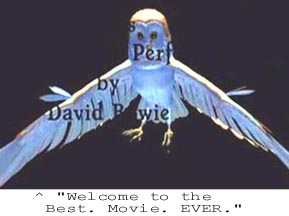
Underground
Wow. We can't praise this song enough.
It makes the viewer's first impression as the movie starts. The clouds part, and with dangling talons and a flap of speckled wings,
we're off and flying with Jareth through the opening titles. His voice is so beautiful here, soulful and falling
with the emotions.
And in keeping with the best of Bowie history (Young Americans!), "Underground" is fun and energetic, but has a lot to say.
It's too deep to understand on your first time through, and it gives the Labyrinth a distinct home:
The Underground, the fantasy place we all want to go to when life sucks.
This is the only track that seems to be performed by Bowie as himself, not Jareth.
It sounds like his reflection on the film itself and on Sarah's emotions, and it celebrates what
"Labyrinth" does best, what we love most about it: Glorious Escapism.
This is in our Top 3 of "Best Bowie Songs," and it's one of our favorite songs ever, by anyone.
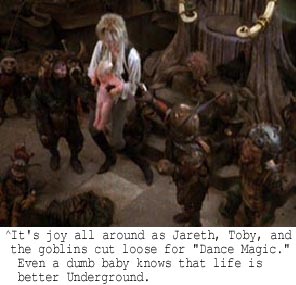
Dance Magic
This is the catchiest tune in the movie. It's a great, upbeat song that puts you in a good mood.
Its proper name is "Magic Dance," but Henson and Bowie have called it "Dance Magic" as well.
Everybody seems to love this song, which is unusual for your average Bowie tune, but normal practice for an
album.
Sometimes he seems to flirt with commercialism and will put a token song like this on an album as a sort of
deliberate statement that he's capable of writing catchy, crowdpleasing stuff, but maybe it's not his favorite thing
to do. (Most Bowie songs are more complicated than this kind of happy, straightforward pop.) It's also a tradition for
soundtracks to have a song like this, something bouncy for Act 1 to get the audience in the correct
feel of the movie.
This is the first Jareth Song and it establishes the other side of his character. He begins as a
threatening presence, but Dance Magic is a show of his daily life. He is King, but a
restless young royal surrounded by hordes of goblins that he has no particular affection for.
He finds ways to amuse himself, and Toby is a new plaything for him. Dance Magic could be considered
"Toby's Song," as he kind of inspires it, and he enjoys this sequence as much as Jareth does.
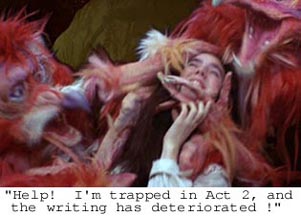
The Fiery Song
The real name for this song is Chilly Down, but most people just know it as The Fieries, the part of
Labyrinth that everyone hates. Unfortunately (?),
it can't be reviewed as music because people often FF through The Fieries and therefore don't/can't pay attention to
the tune. This sequence is the low point in Labyrinth for its sudden, disruptive, and pointless onset.
It actually feels like an editing mistake, a bit you'd find in the Deleted Scenes, which is
where it belongs. It's much too long (3:45, if you're interested) and inherently freaky and
disturbing. And not Freaky in the good, Hensonian, "I'll appreciate it when I'm older," Labyrinth way.
It's also bizarre because it's the only track that Bowie wrote but did not perform.
So it's not really "A Bowie Song" as much as The Worst-Imaginable Cover of one. This is kinda normal, as most Bowie albums have a cover on them somewhere. But it's the crazy, Labyrinth version of this phenom, which is ass-backwards, Pin-Down, inverted Non-Bowie.
The only good thing about Chilly Down is that it brought the slang "Chilly Down" into the urban lexicon. You don't hear this
often, but it's a great alternate for Chill Out, which was novel enough at the time of Labyrinth but has since
become painfully dated. Chilly Down may be on the edge of a comeback. (We hope so.)
In conclusion, we can't review The Fiery Song because we've never been able to get through the whole thing.
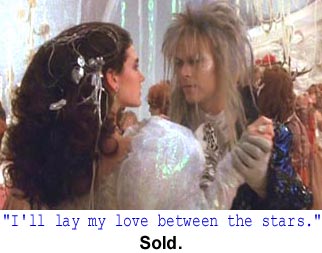
As the World Falls Down
We don't think Bowie is the lovey, romantic type. He doesn't write a lot of purely warm Love Songs; he seems
uncomfortable with mushy stuff, especially in film. (His few
weak moments as an actor tend to involve this material.) And while he can sell an awesome, catchy ballad with the best
of them (Soul Love, Absolute Beginners), he's even more skilled at presenting relationships from different angles,
like raw sexuality (Cracked Actor), and sexy love that is slightly, delightfully inappropriate (China Girl).
For songs like Lady Grinning Soul, there's a special realm of Pure Love with an element of confusion
or sadness. As the World Falls Down belongs here, as it describes the dizziness of First Love (for Sarah)
and the appeal of forbidden romance in a dream-like state. This is a beautiful song, though not big and sweeping like so many popular ballads. It has a lingering pace for the tension between these two characters, and
it gently pulls you into the fantasy. Bowie's voice is soothing and coaxing as Jareth, who is now a
princely gentleman with promises of faithfulness.
For this protagonist and the would-be villain who's secretly infatuated with her, the Underground offers
love and devotion, the perfect romance that only an idiot would refuse. (We don't need to tell you which idiot.)
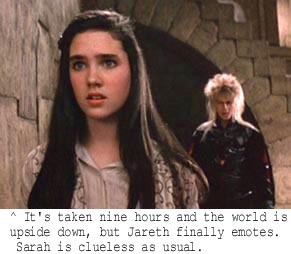
Within You
This is another example of Classic Bowie, the Angsty-Relationship type of song. It's desperate and angry, everything
that Jareth is going through in this competition with Sarah. His voice is pained as he contemplates his own villainy,
his unrequited love, and his inability to reconcile them. "Within You" is
like a summary of many Bowie love songs; it taps some of the ideas that haunt them, particularly
the actual hatred of Love for its disruption of our lives and the pay-exchange it demands of our autonomy.
To Jareth, this means
loss of power and control. And he loves Sarah, but sees her as cruel and ungrateful. It may seem convoluted, but from
his perspective (this truly is Jareth's Song) it's all valid.
In the end, he's in a hopeless love relationship and can't deal. He's limited to his own viewpoint and
can't understand why Sarah doesn't want him. As Goblin King, he can't cope at all. He's childlike and spoiled enough that "Within You" has elements of a child's tantrum, however eloquent. It also comments ambiguously on the weird dynamic between Sarah and Jareth ("though I do believe in you," "I can't live within you"), opening all
possibility on how faith affects their power levels, perhaps mutually. (?)
With such range of feeling and content, Within You has understandably loose structure. Some fans really love
this song, but it's hard to evaluate it as a stand-alone. Jareth's mental turbulence is
very attractive (especially when set to Escher's crazy stairs), and his heartbreak - captured so minutely in a wayward
glance offscreen - may
be Bowie's greatest moment on film.
Go On To...
The Music Videos
Go Back To...
Jareth's Main Page
The Labyrinth Main Page
©2011 The Labyrinth Pages
c/o Champion Valley






